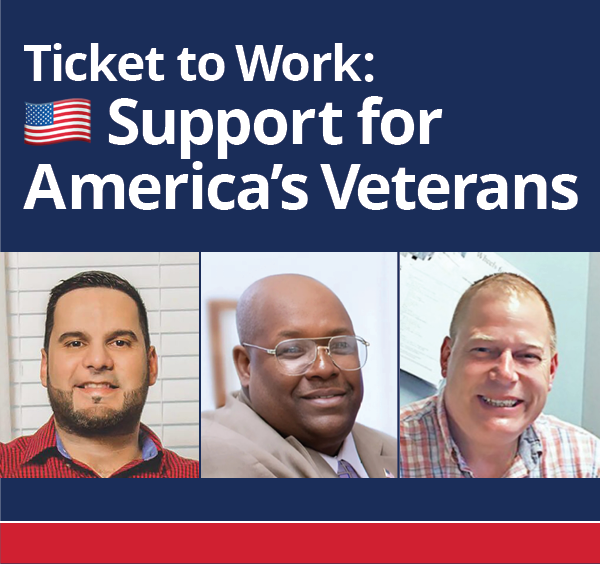Social Security makes every effort to ensure that any information published is accurate and up to date, but some information on this webpage may be historical.
Ticket to Work: Support for America’s Veterans
Published in 2024
 Social Security's Ticket to Work (Ticket) Program recognizes that military veterans have a lot to offer employers. For veterans receiving Social Security Disability Insurance (SSDI) or Supplemental Security Income (SSI), the Ticket Program offers help to identify transferable skills, prepare for and find civilian job opportunities. Ticket Program service providers helped veterans Angel, Robert, and Jeff successfully transition to the civilian workforce.
Social Security's Ticket to Work (Ticket) Program recognizes that military veterans have a lot to offer employers. For veterans receiving Social Security Disability Insurance (SSDI) or Supplemental Security Income (SSI), the Ticket Program offers help to identify transferable skills, prepare for and find civilian job opportunities. Ticket Program service providers helped veterans Angel, Robert, and Jeff successfully transition to the civilian workforce.
What is Ticket to Work?
Ticket to Work is a program that connects eligible individuals with free employment services to help them enter or re-enter the workforce. If you’re a veteran age 18 through 64 who receives Social Security disability benefits and you’re looking for a job in the civilian workforce, the Ticket Program may be right for you. Ticket Program service providers, such as Employment Networks (EN), provide career counseling, job placement assistance and ongoing employment support. Examples may include services such as assistance with setting work-related goals, resume writing, interview preparation, job coaching, disability disclosure, and job accommodation requests. Because many civilian employers do not understand military terminology, an EN can also help you highlight your skills in a way that makes sense to them.
Meet Angel
 Angel sustained neck and back injuries during his service in the U.S. Air Force. After two tours, at age 30, he was in constant pain and felt as though he couldn’t move or work as he had previously.
Angel sustained neck and back injuries during his service in the U.S. Air Force. After two tours, at age 30, he was in constant pain and felt as though he couldn’t move or work as he had previously.
Angel was medically retired from the Air Force and started receiving Social Security Disability Insurance (SSDI), which allowed him to focus on his health.
Angel was subsequently diagnosed with thyroid cancer and by his own admission, was “overwhelmed by the weight of disability and illness.” With treatment and support from family, Angel beat cancer. He then began to think about his future, including work.
A friend told him about a company that hired information technology (IT) professionals to support the U.S. Department of Defense. The company was a federal contractor. A federal law, Section 503 of the Rehabilitation Act of 1973, requires federal contractors to take action to promote the hiring and retention of qualified individuals with disabilities. Angel was qualified for the position, and he was willing to identify as an individual with a disability.
Angel was offered the job, but he had questions about what full-time employment would mean for his disability benefits. He contacted the Ticket to Work Help Line to get answers.
The Help Line helped Angel connect with an Employment Network (EN), The Choice Group, that provided him with free benefits counseling. His Benefits Counselor informed him about Social Security Work Incentives that help adults with disabilities transition to work as they continue to receive Medicare or Medicaid and, in some cases, benefit payments. With this information, Angel accepted the position and now works with military peers and uses the problem-solving skills, work ethic, and teamwork skills he learned in the Air Force.
"Being back at work has had a positive impact in so many areas of my life," Angel reflects. "I've been able to [show] my children the rewards that can go with perseverance and resilience. The job has helped me build confidence, maintain good mental health, and regain a sense of accomplishment… all vital for the next chapter in our lives."
Meet Robert
 Robert spent seven years serving in the U.S. Army. As a result of a surgery mishap, he sustained a spinal cord injury and was left with limited mobility. He was working as a U.S. Postal Carrier, but with his injuries, he couldn’t continue. He began receiving Social Security Disability Insurance and focused on his rehabilitation.
Robert spent seven years serving in the U.S. Army. As a result of a surgery mishap, he sustained a spinal cord injury and was left with limited mobility. He was working as a U.S. Postal Carrier, but with his injuries, he couldn’t continue. He began receiving Social Security Disability Insurance and focused on his rehabilitation.
Through the U.S. Department of Veteran’s Affairs (VA), Robert connected with the Paralyzed Veterans of America (PVA). They informed him that part of their organization provides services through the Ticket Program, so he was able to receive free benefits counseling.
Robert and PVA worked together to create an Individual Work Plan to continue his education in social work. Robert progressed in school and started volunteering, which led to a desire to help others. Robert started a position at PVA as a National Service Officer, where he would be an advocate for other veterans to get the services they need.
From Service to Success: Resources for Veterans
Many Ticket Program service providers specialize in helping veterans. Paralyzed Veterans of America (PVA) is an Employment Network located in all 50 states at VA medical centers and regional benefits offices. PVA hosts PVA Veterans Career Live, a weekly webinar focused on employment.
Many other service providers are ready and able to serve veterans. Find a service provider by using the Find Help Tool. You can identify service providers who specialize in serving veterans or choose another service provider from the directory.
Social Security offers many resources for veterans including:
- Information for military and veterans about benefits eligibility and Social Security Work Incentives
- The Journey to Success publications series with guidance on employment tools for your path to work, from searching for a job to transitioning to work and financial independence
- Useful links from the Department of Veterans Affairs and the Department of Defense
Meet Jeff
 Jeff was a car enthusiast who applied his knowledge of fixing things to the Marine Corps Tank Unit. During his time in the Marine Corps, he learned skills that he carried into civilian life as a limousine mechanic.
Jeff was a car enthusiast who applied his knowledge of fixing things to the Marine Corps Tank Unit. During his time in the Marine Corps, he learned skills that he carried into civilian life as a limousine mechanic.
After his transition to civilian life, Jeff was in a motorcycle accident. He was severely injured, with multiple broken bones and extensive nerve damage. He began receiving Social Security Disability Insurance (SSDI), spent years enduring surgeries, and finding new ways to perform activities of daily living.
In time, Jeff made progress in his recovery and decided to go back to school. Unsure of how he’d pay for it, he received a letter from Social Security with information about the Ticket Program. He connected with his State Vocational Rehabilitation agency (VR). A career counselor helped him develop goals that aligned with his career objective and secure funds to cover his college expenses.
His VR also connected him with the disability services office at the college. They worked together to educate him about assistive technology and reasonable accommodations. "I got a lot of accommodations, such as help with taking notes, audiotaped lessons, a separate testing area…" he recalls. Jeff earned an associate degree and then went on to complete a Bachelor of Arts in psychology.
After his VR services ended, Jeff began receiving services from the County of Genesee American Job Center, a Ticket Program service provider, where he learned about Work Incentives. Inspired by those who helped him, he decided to pursue a career helping others. Jeff was offered and accepted an Employment Training Counselor position with the Job Center.
Ticket to Work helped these veterans find their path to a better future. Find yours! To learn more, call the Ticket to Work Help Line at 1-866-968-7842 or 1-866-833-2967 (TTY), or visit https://choosework.ssa.gov/.